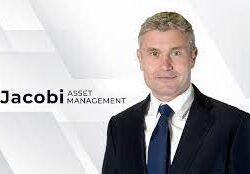Jacobi Asset Management is launching Europe’s first Bitcoin exchange-traded fund and chairman Jamie Khurshid said it is a tipping point for mainstream adoption of the cryptocurrency.
Khurshid told Markets Media: “We are on the main stage and will have traditional instruments that are a familiar way for people to get involved in digital assets. Digital assets are clearly going to be part of the future of finance.”
Jacobi was launched in May 2021 with Khurshid, a former Goldman Sachs investment banker, as chief executive. Since August 1 this year Martin Bednall has taken over as chief executive with Khurshid becoming chairman of the board, and former chairman Roy McGregor remaining as a director. Bednall spent over thirteen years at BlackRock, including as co-head of the the product team of iShares, the asset manager’s ETF arm. He has spent the last eight years as managing director at FinEx Capital Management and will maintain this role.
Khurshid said he launched Jacobi to counter the market’s perception of the digital asset space and reduce risk as he was focused on regulation during his investment banking career.
“There was so much misinformation in the digital asset space and people were just pushing their own agenda,” adde Khurshid. “My dad actually came to me in 2017 or 2018 and asked if he should buy bitcoin, despite not knowing anything about it.”
His agenda was to reduce counterparty risk as investors looked to buy bitcoin on unregulated exchanges, as well as reducing the technology risks associated with holding bitcoin. Khurshid said: “For those who want to buy bitcoin, we wanted to go down the traditional finance route of buying it in a way that investors understood.”
The Guernsey Financial Services Commission authorised the Jacobi Bitcoin ETF, a centrally cleared crypto-backed financial instrument, in October 2021. The Jacobi Bitcoin ETF is slated to launch in August 2022 on Euronext Amsterdam with custodial services provided by Fidelity Digital AssetsSM, and Flow Traders and DRW as market makers.
“It has taken us almost two years because it’s not easy to launch a regulated product,” adde Khurshid. “We have achieved what I wanted, which was to demonstrate that it could be done with the regulator on side.”
Edd Carlton, institutional digital asset trader at Flow Traders, said in a statement that the new ETF is aligned with the growing demand from institutional investors who are looking to diversify their portfolios by adding Bitcoin and other digital assets. Carlton added: “We are excited to be acting as lead market maker for Europe’s first Bitcoin ETF, which is another milestone in the development of the institutional digital assets space.”
Other crypto exchange-traded products (ETPs) have been launched in Europe but Kurshid said: “ETPs are not just like ETFs. ETPs have inherent counterparty risk as investors are buying a debt instrument – if the issuer has a catastrophe and that company disappears, can you get your bitcoin back ? No.”
He continued that ETPs did a good job in helping to raise awareness of investing in digital assets through an exchange-listed product but ETFs are a natural progression. “ETFs are a catalyst for that tipping point of adoption,” added Khurshid.
Crypto valuations have fallen this year but Bednall said Jacobi is not tying to time the market, but providing a better tool for investors to invest in bitcoin and other digital assets.
Bednall said: “For example, wealth managers or private banks can hold our bitcoin ETF just like any other any other ETF in their portfolio.”
He told Markets Media that he wanted to join Jacobi because it is a fantastic opportunity to work at a startup looking to grow in an asset class that is in its infancy but has enormous potential.
“What I learned at iShares developing lots of products in different asset classes is that you’ve got to put out products that investors are asking in a sensible way,” Bednall added. “We won’t just throw spaghetti against the wall.”
The growth strategy includes developing a suite of ETFs which could include ethereum as the next cryptocurrency, baskets of cryptocurrencies, yield products or a basket of blockchains.
“Digital assets move quickly and we have created a bridge for the first time to the slower, traditional marketplace,” said Khurshid. “Getting Martin on board, who Is well known in the ETF industry, shows there is a future for digital assets in traditional finance which should hopefully percolate through the industry.”
In the US the Securities and Exchange Commission has only permitted bitcoin futures ETFs, and rejected all the applications for spot bitcoin ETFs.


